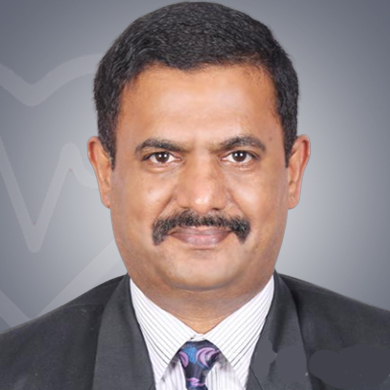
Spine & Neurosurgeon
Apollo Hospital , Chennai, India32 Years of experience
Speaks: English
Dr. Chandrasekar K is presently working as Consultant Neurosurgeon at Apollo Hospital, Chennai. He has over 20 years of clinical experience. In the year 1989, Dr. Chandrasekar completed his MBBS from Bangalore University. Later, in 1994, he did his M.Ch. in Neuro Surgery from the National Institute of Mental Health and Neurosciences (NIMHANS). He has also been awarded Fellowship in Vascular and skull base Surgery from Dep. Of Neurological Surgery, Washington in 2001 and Fellowship in Vascular & Endovascular Surgery from St. Elizabeth Zickenleuis, Dep of Neuro-radiology, The Netherlands in 2002.
Dr. Chandrasekhar is an expert in handling critical and complex neurological cases. He has a special interest in Repair CSF Rhinorrhea, Pediatric Neurosurgery, Paralysis, Peripheral Nerve Disorders, and Brain infection. He is an esteemed member of the Indian Medical Association. Because of his high expertise in performing neurosurgery with high success rates, he has become a well-known name in the field of neurosurgery.
A neurosurgeon is a medical specialist who diagnoses and treats conditions affecting the nervous system, including the brain, peripheral nerves, spinal cord, and spine. Neurosurgeons offer non-operative as well as surgical treatment to patients. Here is a list of some of the conditions Dr. Chandrasekar K treats:
Neurological conditions produce different symptoms ranging from mild to severe. You should never ignore any such symptoms because these may lead to severe results if left unaddressed. Some of the signs and symptoms that neurological disorders can produce are listed below.
Neurological disorders can cause mixed symptoms, such as difficulties in moving, speaking, learning, swallowing, breathing. According to brain specialists, there are more than 600 neurologic diseases that cause mild to severe symptoms. Having a neurological disease could have a deep impact on the patient’s life. It is very important that a person should seek medical advice from a neurologist.
You can find Doctor Chandrasekar K in the clinic/hospital from 11 am to 5 pm (Monday to Saturday). The doctor is not available on Sunday. Call the doctor or his attendant to confirm his/her availability because the doctor may not be available due to some personal reasons or any emergencies.
The popular procedures that Dr. Chandrasekar K performs are listed below:
Dr. Chandrasekar K is a renowned neurosurgeon who is known for his patient-centric approach and high success rate. The doctor evaluates the condition of the patient completely before performing any procedure to understand the risk associated with the procedure. With vast experience in performing even the most complex cases with high precision and accuracy, the doctor follows medical protocols in order to ensure patient safety. Also, the doctor is abreast with the latest techniques.

Share Your Experience about Dr. Chandrasekar K

A neurosurgeon is a doctor who specializes in the diagnosis and surgical treatments of conditions of the central as well as the peripheral nervous system. A neurosurgeon completes special training after becoming a doctor, including one year of residency in general surgery and a few more years of residency in neurosurgery. Some neurosurgeons complete fellowship training, which is additional training to further enhance their focus within the field of neurosurgery. Neurosurgeons are regarded as highly trained specialists who perform some of the most critical surgeries on the brain and spine. The nervous system being the most complicated part of the body needs great precision and accuracy while performing surgery. Neurosurgeons also may also consult other specialists and medical professionals as per the requirement of surgery.
Diagnosis tests act as an important tool to find out the condition(s) a patient is suffering from. So, a neurosurgeon will ask you to get a few tests done so that they get to know the cause of the symptoms which further helps in finding the condition the patient is suffering from. Based on the diagnosis, the doctor can start appropriate treatment. A neurological examination may include the following:
For the diagnosis of neurological conditions, you need to have one or more of the following tests::
Here are some of the common signs that you must seek the medical assistance of a neurosurgeon:
Dealing with the entire nervous system, neurosurgeons treat all the parts of the body that are affected by nerve issues. They do complex surgeries on the brain. Before starting treatment, they diagnose patients' symptoms and design minimally invasive treatment plans.